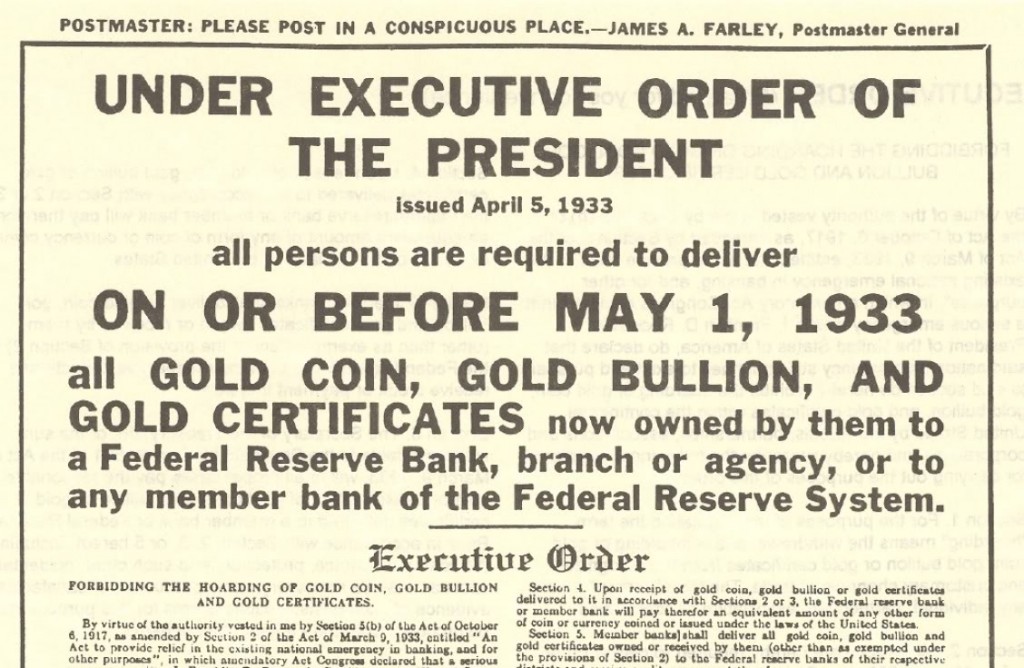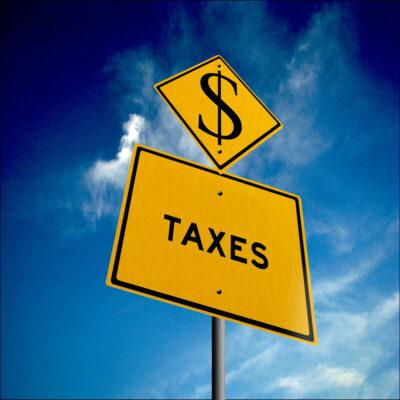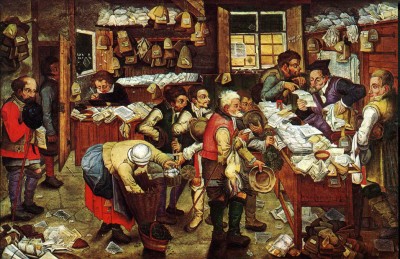Should You Be Scared of Gold Confiscation?

By Guy Christopher
The specter of government forcefully confiscating gold is still roaming around out there.
That nagging prospect dampens many buying decisions, unfortunate at a time when gold, and especially silver, are near historically bargain basement prices when measured in fiat currency.
Buy low, sell high only works for those who buy low.
Somewhere in everyone’s buying decision is rebellion against government lunacy. So, what’s the plan if government outlaws that defiance?
In examples spanning eight decades over three continents, ordinary people caught in very different circumstances chose to defy government repression of personal gold ownership.
In the 1930s, President Franklin Roosevelt and Nazi dictator Adolph Hitler joined global, repressive trends by outlawing private ownership of more than five ounces of gold.
Many skeptical Americans responded by stiffing FDR, shipping outlawed gold overseas for safekeeping, or burying it on family farms. That gold remained hidden for four decades, until Gerald Ford lifted restrictions in 1974.
Europeans targeted by Hitler’s murderous genocide improved their chances of escape using outlawed gold. It paid for bribes and safe passage away from Nazi atrocities and helped refugees build new lives once they stopped running.
In recent years, repressive gold policies in India jolted that continent, where gold lives deep in the DNA, essential to religious ceremonies and social structure.
Tax hikes and import restrictions were meant to protect the paper rupee. Citizens rebelled by dodging taxes, launching legal challenges, and doubling down on gold smuggling, while keeping demand for gold at a steady level. New Delhi was forced to rethink its repression, pushing a unique national discussion about gold to the forefront.
Today, a different crime of confiscation, stealing the value locked in gold and silver, is also failing.
Illegal, documented, proven and now admitted bullion bank price manipulation has likely denied gold and silver owners realistic, much higher values.
Each price suppression scheme in past years has failed when governments ran out of physical gold necessary to disguise crooked markets. As the current scheme fails, the pace accelerates, with exposed banks beginning to turn on each other.
Another confiscation is taxation when metals are sold for paper profit. Your practical, legal way to avoid that confiscation is to keep your metal instead of trading it for paper. That works great for those who see metals as money and savings, not investments.
That brings us to the chilling specter of that black-ops squad coming to confiscate your coins and bars.
Even in the 1930s, jackboots didn’t actually knock on doors to round up the gold. And the government’s call for everyone to turn in their gold didn’t work very well. Would it even be attempted now?
Two internationally respected economists have opposing views on confiscation, but come to the same practical conclusion – always be buying gold.
Acclaimed Austrian School economist Dr. Marc Faber is known for predicting the 1987 stock market crash and the birth of the current gold bull market.
He’s often argued the U.S. is “corrupt” and would force an expropriation of private gold, paying as little as possible. Faber seeks safety geographically, saying he would never hold gold in the U.S. or even in his Swiss homeland, feeling vaults in Asia are safer.
Economist, author and investor Jim Rickards is the guy who used to teach financial warfare to Pentagon generals. He sees any government confiscation attempt as “unenforceable” and “unlikely.”
Rickards believes the day government really wants your gold, it will simply offer a high price to coax it from you, paying with paper money freshly printed that morning. The offer would be high enough to outbid competing market expectations. Otherwise, he says the Fed doesn’t mind the price gradually rising.
Faber and Rickards, both recent Money Metals podcast guests, believe the planet is just one or two missteps away from a disastrous economic meltdown. Both make credible arguments the U.S. Federal Reserve and other central banks are inhabited by buffoons.
Both men are buying gold and silver and recommending you buy gold and silver too.
Rickards advises ten to twenty percent of invested wealth should be in physical gold. Incidentally, his studied math says gold today should be valued at many thousands per ounce.
Faber says he buys gold every month and doesn’t intend to ever sell, despite his concern for confiscation. Says Faber, “we don’t know how the world will look ten years from now.”
What’s the plan if Faber is right?
You’ll have warnings. News of intentions will leak. Lapdog media, fond of demonizing physical gold, will begin demonizing individual gold owners.
A familiar comparison is firearms ownership. While most Americans know little about gold, they do understand what’s at stake in the up-close-and-personal 2nd Amendment gunfight.
America’s reaction to constant, hard-nosed threats of firearms confiscation has been – buy more firearms! And extra ammo!
Sales zoom every time the subject comes up. Gun makers love to say Obama is the world’s best gun salesman.
A government gold grab would mimic anti-gun rhetoric, tagging gold as a “national economic concern,” just as Richard Nixon blamed “speculators” for his international gold default in 1971.
Gold demand (and prices) would skyrocket at the first sign of trouble.
And what if Rickards is right?
The notion the Fed might engineer a red hot gold price instead of a ham-handed confiscation is suggested by credible studies and by a former Fed Governor. Don’t forget Alan Greenspan saying gold is going “measurably higher.”
Should market prices zoom ahead of banking price suppression in the race to the top, a paralyzed Fed may have no choice, just to establish its own cap on the all-important gold price.
Fears of “forced confiscation” might all but disappear – for awhile. Many gold owners would happily sell for overnight paper profits.
Many others, with no trust whatsoever in government, would keep their gold, choosing to wait and see.
http://www.activistpost.com/2016/05/should-you-be-scared-of-gold-confiscation.html?utm_source=feedburner&utm_medium=feed&utm_campaign=Feed%3A+ActivistPost+%28Activist+Post%29
Imagine, A World Without Taxes (Here’s What It Would Look Like)
Imagine living in a world without taxes. Granted, that’s a bit unlikely to happen, considering mankind’s long history with taxes. It seems that taxes and government go hand-in-hand. It doesn’t matter if you’re talking about the old European feudal system — where Barons and Earls taxed the serfs and merchant caravans crossing their lands — or you’re talking about modern socialistic and democratic governments. All governments tax. Not only does it give them a source of revenue, but it gives them a way of controlling the people.
Nevertheless, let’s indulge our imaginations for a moment and think about the difference that would make to live in a tax-free society. While I don’t expect ever to find such a utopia, seeing what it would be like will show us what taxes are doing to our society.
The first thing we’d all see is more money in our pockets. While the figures from various government watch agencies vary, right now, the average American family pays about 43 percent of their income out in taxes of one sort or another. That’s a lot higher than we expect, mostly because our tax bill is broken into many different pieces. We see the obvious ones like income tax, property tax and sales tax, but there are many, many more.
With an average family income of about $53,657 in 2015 (according to census bureau data), that works out to the average American family paying $23,073 per year in taxes. While this number rises and falls with the political winds and the unstable economy, just knowing that some of us pay out more than $23,000 per year in taxes is shocking enough.
So, if we were to eliminate all of those taxes, you would suddenly have an extra $23,000 that you could use, assuming that you are the theoretical average family. So, what would you do with it?
I’m sure if we polled ourselves, we’d find all sorts of noble sentiments about how we would use that extra money. Some would talk about saving for retirement, putting their kids through college, giving to non-profit organizations and otherwise making the world a better place to live. But let’s be honest, while all those things are great ideas, the reality is that if we had an extra $23,000, we’d probably spend it.
 We’re all much better at spending than we are at saving, and we can always find something that we need to spend extra money on. No matter how many noble intentions we have, a raise in income generally means a raise in our standard of living, not in our standard of saving.
We’re all much better at spending than we are at saving, and we can always find something that we need to spend extra money on. No matter how many noble intentions we have, a raise in income generally means a raise in our standard of living, not in our standard of saving.Now, that’s not all bad. Spending money is actually good — good for the economy, that is. One of the major reasons that our economy has been stagnant since the 2008/2009 housing bubble crash is that people and businesses have been afraid to spend money. If there’s one thing that Obama has been good at, it’s getting people to stop spending.
That lack of spending is costing people jobs. If it continues, it could lead to an even worse economy. You see, it’s not the amount of money that exists which make the economy work, but how much of it is moving around. We need that money moving around, creating millions of transactions per day where people buy and sell products and services, so that the money gets into other people’s hands and they can spend it, too.
Let me put it this way. Let’s say that someone has $1 billion dollars and they use it to stuff their mattress, instead of spending it, investing it or even putting it in the bank, so that the bank can invest it. That money does nobody any good. With no goods and services being purchased, that money doesn’t do a thing to help the economy … worse, it doesn’t do a thing to give people jobs.
Okay, so there are somewhere around 116 million families in the United States (2007 figures). If each of those families had an extra $23,000 to spend in a year, it would work out to $2,668,000,000,000. That’s $2.68 trillion dollars; enough to buy more 85 million cars, 7,473 brand new 747 jumbo jets, 2,151 new cruise ships, or to build the world’s tallest building, Dubai’s Burj Khalifa 1,778 times. We could even pay off the national debt in a little over seven years or pay off the combined student debt in less than six months if we so chose.
How many jobs would be created by all of those purchases? There’s no real way of telling. But it’s clear that the number of new jobs created by that much additional cash flowing through the economy would be significant. Granted, the government is putting that money through the economy right now, paying for a myriad of different products, services and entitlements. But no government spends money efficiently. They don’t have to; after all, it’s taxpayer money, not real money.
The point is, every dollar the government takes out of our pockets in increased taxes has to come out of something else. It doesn’t come out of some untapped pool of money that people are sitting on. That doesn’t even happen with the wealthy. Taxing them more, a favorite Democrat tactic, just means that they don’t invest that money in other money-making ventures. In other words, they don’t give people jobs.
 Ultimately, it is the government that controls the economy and thereby controls jobs. Not by the Fed’s discount rate, as everyone assumes, but by the policies that they make, taking money out of our pockets in the form of taxes. They also control inflation, taking more money out of our pockets by creating money out of thin air in schemes like quantitative easing. So, when people complain about the lack of jobs; what they’re really saying is that the government is hurting the economy too much.
Ultimately, it is the government that controls the economy and thereby controls jobs. Not by the Fed’s discount rate, as everyone assumes, but by the policies that they make, taking money out of our pockets in the form of taxes. They also control inflation, taking more money out of our pockets by creating money out of thin air in schemes like quantitative easing. So, when people complain about the lack of jobs; what they’re really saying is that the government is hurting the economy too much.Taxes — all taxes — have a negative influence on the economy. But we really can’t get rid of them. We need the government, although we probably don’t need as much government as we have. Yet governments don’t shrink on their own; they only grow. New departments are created, requiring funding and causing more tax increases. Eventually, the people revolt or the economy reaches a point where it can’t support the government — and it collapses.
Plant A Full Acre Of Food With This Emergency Seed Bank!
Since we need our government, that means we need taxes, too. In fact, the Constitution gives the federal government the right to collect taxes. It says, “The Congress shall have power to lay and collect taxes, duties, imposts and excises, to pay the debts and provide for the common defense and general welfare of the United States; but all duties, imposts and excises shall be uniform throughout the United States.”
So fine, let them collect their taxes and let them use them for the common defense and the general welfare of the United States. But that’s it. Let’s put an end to pork barrel spending, research grants for useless things and other wasteful government spending. Let’s stop giving millions away to our enemies, so that they can chant “Death to America.” Let’s stop with all the departments of the government that only exist to take away our freedoms and so that the bureaucrats can tell each other how important they are. Let’s have a reasonable government and reasonable taxes.
Maybe then, our economy could return to the robust, growing economy of our parents’ generation. We would see our children have a better life than we have and we could expect their children to have an even better life than that. Maybe then, the people of the United States of America would become prosperous once again.
http://www.offthegridnews.com/financial/imagine-a-world-without-taxes-heres-what-it-would-look-like/
No comments:
Post a Comment